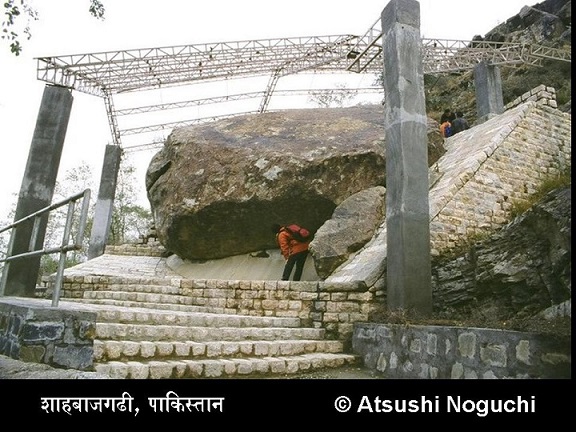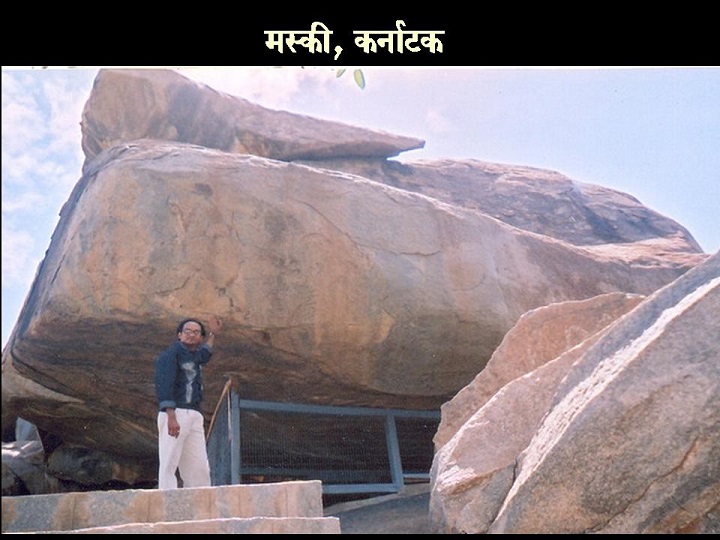Dr. Ashok Aklujkar, Professor Emeritus at the University of British Columbia in Vancouver, Canada, demonstrated the need for reexamination of the date of Emperor Aśoka in a lecture at the Massachusetts Institute of Technology on Saturday, March 19, 2016. The lecture was hosted by the MIT student organization MIT Samskritam, the Cambridge based social service organization South Asia Center and the newly formed non-profit educational group India Discovery Center, based in Lincoln, Massachusetts. The meeting was attended by more than fifty persons consisting of students, faculty and public. A thirty minute “Question and Answer†session followed the lecture.
The date of Emperor Aśoka has been the key in constructing India’s early history. The stone inscriptions thought to have been produced by Aśoka are the only evidence of use of writing in the earliest history of the Indian subcontinent. Fourteen “major†and sixteen “minor†rock carvings have been discovered so far, mostly in what scholars have named Brahmi script. There are also a few inscriptions in Kharoshthi, Aramaic and Greek scripts in the northwest of the subcontinent. Besides these, there exists a good array of pillar inscriptions scattered in northern India.
The carvings were “read†by the English civil servant James Prinsep in the early part of nineteenth century. A part of the corpus pointed to a yona/yavana/Ionian king Antiochus II of 3rd century BC. With the name AÅ›oka becoming available in some of the minor edicts, a connection with AÅ›oka was thought to have been established. The rest of India’s ancient history was constructed on the basis of the dates of the Ionian Greek Kings. Thus, the date of Emperor AÅ›oka becomes the key in constructing ancient India’s history. The dates of the Buddha and MahÄvira, for example, are determined by adding a hundred or two-hundred-and-sixteen/eighteen years to the date of Emperor AÅ›oka.
There were several scholars, especially from India, who were doubtful about the dating done. However, K. D. Sethna, working in Sri Aurobindo’s Ashrama in Pondicherry, was the first to cast doubt on the derived dates through a systematically developed essay. His starting point was the travelogue by Al Beruni. This Arabic scholar put the end of the Guptas before the beginning of the Christian era. The Mauryas, who include Aśoka, would then be six hundred years before the third century BC to which Aśoka is assigned at present. To support this implication, Sethna also made a good case to the effect that Sandrocottus whom Alexander the Great met was really the Chandragupta of the Gupta dynasty, not the Chandragupta of the Maurya dynasty.
Prof. Aklujkar gave new philological observations on the Major and Minor inscriptions and endorsed the findings of the late Sethna. The important points that Prof. Aklujkar brought to the discussion were: (a) the inscriptions are much later than Aśoka’s lifetime; (b) their locations point to not being the results of a royal decree but to being products of the monks of later periods.
Prof. Aklujkar also presented a new explanation of the much-discussed term “Devanampiya.†This explanation, similar in effect to English “late lamented†but literally meaning “one who was the beloved of gods (since they took him from us against our wishes)â€, fitted Prof. Aklujkar’s other philological observations.
During the Question and Answer session various implications of Prof. Aklujkar’s conclusions were articulated. Setting Emperor Aśoka five to six hundred years back would raise questions regarding the dates of the Vedic civilization and the so called “second urbanization.†In short, Prof. Aklujkar suggested systematic research to rewrite the history of India in the pre-Christian period.
Dr. Rajesh Kasturirangan of South Asia Center proposed a vote of thanks. The guests were invited to a supper hosted by the South Asia Center. Dr. Krishna Gazula, Mr Janmejay Shishupal, Mr. Sanjeev Tripathi, Ms. Swati Dave, Ms. Chandrika Govardhan, Mr. Prem Nagar, Ms. Preeti Nagar, Ms. Hardeep Mann and Mr. Jaspal Singh were thanked for their assistance in organizing the hospitality.



